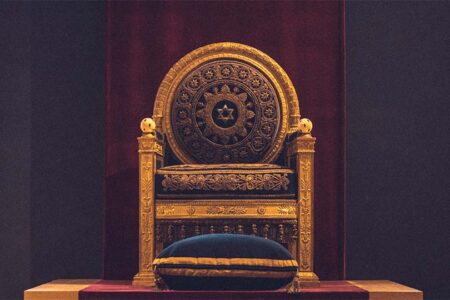Preparation For Perilous Times
2 Timothy 3:14–17
The apostle Paul was martyred during the rule of Roman Emperor Nero, an evil, diabolical man whose vicious cruelty and brutality toward Christians were beyond description. Before Paul died, he warned believers that worse times were coming in the last days.
One only need look at the moral decline in society today to see Paul’s prophecy taking shape. The increase in lawlessness, materialism, and hostility toward God and the Christian faith; the rise in immorality; and the decline in the value of human life are some of the signs.
Paul taught his protégé Timothy how to prepare for ministry without him in a decadent world. Timothy was to remember three things: his early preparation by a godly mother and grandmother who led him to Christ (2 Tim. 3:14–15), the inspired Word of God’s power to counter doctrinal error and apostasy (v. 16), and how he was equipped for ministry (v. 17).
Spiritual Exhortation
Paul commanded Timothy to practice what he learned:
But you must continue in the things which you have learned and been assured of, knowing from whom you have learned them, and that from childhood you have known the Holy Scriptures, which are able to make you wise for salvation through faith which is in Christ Jesus (vv. 14–15).
Timothy was to stand fast in what he knew from Scripture even though the world was unraveling, apostasy was growing, and false teachers within the church were multiplying. Timothy’s knowledge alone would profit him nothing unless he put it into practice. Only if we obey the Word do we have the inner conviction, personal assurance, and stability to stand against evil men and their doctrines.
Paul said Timothy could be “assured of” (firmly persuaded) what he learned. His convictions came from God’s Word, which gave him inner stability at a young age. Timothy could have confidence in what he was taught because he had three good sources of learning: Paul, a godly mother, and a godly grandmother.
Paul was Timothy’s greatest teacher because the apostle had a vast knowledge of the Hebrew Scriptures, as well as knowledge he acquired directly from Jesus Christ after his salvation (Gal. 1:11–17). Timothy was also thoroughly trained in the Word by his mother, Eunice, and grandmother Lois. Eunice was a Jewish believer married to a Greek. Nothing is mentioned about Timothy’s father’s spiritual life. Nor do we know if he was still living. Timothy was not circumcised, probably because his father was a Gentile. So Paul circumcised him (Acts 16:1, 3).
Perhaps Lois and Eunice took Solomon’s advice: “Train up a child in the way he should go, and when he is old he will not depart from it” (Prov. 22:6). There is a difference between telling a child to do something and training him to do it. Mothers bond with their children early in life, either for good or bad. Usually, it is the mother who molds a child during the first few years of life. That is why it’s important to quote Scripture, sing hymns about Jesus, and pray for and with a child. Babies learn by repetition. If a child hears God’s Word over and over, the Lord can use the Word to mold his or her character, convictions, conscience, and course of life. Godly mothers and grandmothers can impact children more than they realize.
The word childhood (Greek, brephos; 2 Tim. 3:15) can mean “embryo, newborn,” or “infant.” Thus, Timothy was being grounded in God’s Word from the day he was born.
The word Scriptures (Greek, Gramma) means “letters of the Hebrew alphabet,” obviously referring to the Old Testament because there was no New Testament yet. Eunice apparently used the alphabet from Scripture, as well as commands and laws, to teach her son to read and write. The word holy (sacred) clarifies that Paul was referring to Scripture alone and not to religious literature about Scripture.
Scripture was the primary literature used to train Jewish children, who were taught to memorize passages as soon as they could speak. In fact, Moses commanded Israel to teach children the law of God continuously throughout the day (Dt. 6:4–9).
Although the Old Testament provided only a portrait of the Messiah and His ministry, it revealed God’s holiness, majesty, love, mercy, forgiveness, and redemptive plan for humanity. Thus, knowing the Hebrew Scriptures prepared Timothy “for salvation through faith which is in Christ Jesus” (2 Tim. 3:15). Teaching children Scripture is no guarantee they will experience salvation at a young age, but it could play a major role in them coming to faith in Christ.
Paul emphasized to Timothy how important Scripture is in combating false teaching and apostasy: “All Scripture is given by inspiration of God, and is profitable for doctrine, for reproof, for correction, for instruction in righteousness” (v. 16).
Specifically Equipped
Paul concluded this section by giving the reason for using Scripture: “That the man of God may be complete, thoroughly equipped for every good work” (v. 17).
It is one thing to know God’s Word but an entirely different thing to implement it. The whole intent of Scripture is to make believers “complete,” or well adjusted, capable, possessing the qualities needed to carry out the ministry they have been called to perform. The phrase thoroughly equipped carries the same idea but takes it a step further, meaning God and His Word have totally outfitted believers to minister.
Paul called Timothy “the man of God,” a title usually reserved for prophets in the Old Testament. But this is a title that should be worn humbly by everyone within the church who is committed to Jesus Christ, whether in full-time ministry or not.
Although Timothy would have an extremely difficult call in pastoring the church at Ephesus, he was well prepared for the challenges. The perilous times we live in today will only grow worse. Delusion and deception are sweeping the world. But God and His Word have equipped us to live and minister for Him until He calls us home.







